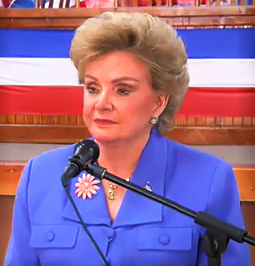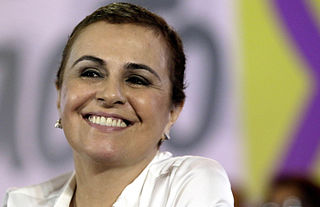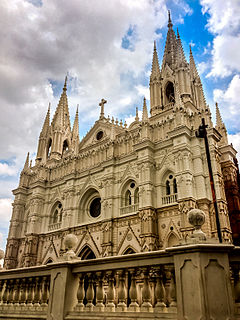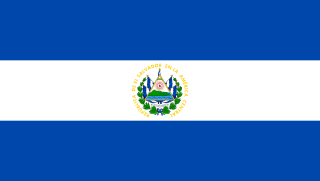
This article is about the demographic features of the population of El Salvador, including population density, ethnicity, education level, health of the populace, economic status, religious affiliations and other aspects of the population.

The culture of El Salvador is a Central American culture nation influenced by the clash of ancient Mesoamerica and medieval Iberian Peninsula. Salvadoran culture is influenced by Native American culture as well as Latin American culture. Mestizo culture and the Catholic Church dominates the country. Although the Romance language, Castilian Spanish, is the official and dominant language spoken in El Salvador, Salvadoran Spanish which is part of Central American Spanish has influences of Native American languages of El Salvador such as Lencan languages, Cacaopera language, Mayan languages and Pipil language, which are still spoken in some regions of El Salvador.
Dina Posada is one of Central America’s best known contemporary poets since the publication of Fuego sobre el madero (1996), a collection of poems that celebrate love, eroticism and the female body.

Salvadoran Americans are Americans of full or partial Salvadoran descent. As of 2010, there are 2,195,477 Salvadoran Americans in the United States, the fourth-largest Hispanic community by nation of ancestry. According to the Census Bureau, in 2016 Salvadorans made up 3.8% of the total Hispanic population in the US.

Lesbian, gay, bisexual, and transgender (LGBT) persons in El Salvador may face legal challenges not experienced by non-LGBT residents. Both male and female same-sex sexual activity are legal in El Salvador, but same-sex couples and households headed by same-sex couples are not eligible for the same legal protections available to opposite-sex married couples.

The El Salvador national rugby union team, nicknamed Los Torogoces, represents El Salvador in rugby union. They had their first international tournament in 2011 in Costa Rica along the other teams from Central America, winning the Silver Cup.
The Salvadoran Rugby Association is the governing body for rugby in El Salvador.
ASAPROSAR is a non-governmental organization that provides health, education, environment and economic development programs in El Salvador.
The Salvadorian Athletics Federation is the governing body for the sport of athletics in El Salvador.
Rosa Judith Cisneros Aguilar (1938-1981) was a Salvadoran lawyer. She was active in the fields of human rights and family planning until her assassination in 1981.
Román Mayorga Rivas (1862-1925) was a Nicaraguan journalist and poet. He is considered the founder of modern journalism in El Salvador.
Estela Gavidia was the first woman to graduate as a doctor in El Salvador, which occurred in 1945. She specialized in gynecology. At the time of her graduation, she was married and known as Dr. Grabowski, though she was eventually widowed.
María Eugenia Brizuela de Ávila is an El Salvadoran lawyer who served as Minister of Foreign Affairs for the country from 1999 to 2003. She was the first woman to become president of a private bank, first woman to run an insurance company, the first sit on the Board of the Central American Institute of Business Administration (INCAE) and the first female Minister. She is currently Director of Corporate Sustainability at HSBC for Latin America and is based in Mexico City.
Rosa Amelia Guzmán was a Salvadoran journalist, feminist and suffragette. She later became the second wife of former Salvadoran president Arturo Araujo and was one of the first three women elected to serve in the Legislative Assembly of El Salvador.

Mercedes Gloria Salguero Gross was a Salvadoran politician, businesswoman and one of the founders of the Nationalist Republican Alliance (ARENA). She served as the President of the Legislative Assembly of El Salvador from 1994 to 1997.

Vanda Guiomar Pignato is a Brazilian-born Salvadoran lawyer, human rights activist, politician, women's rights activist, and former First Lady of El Salvador from 2009 until 2014. Pignato became First Lady of El Salvador on June 1, 2009, the same day that her husband, President Mauricio Funes appointed her as the country's Secretary of Social Inclusion from 2009 to 2014. The appointment made Pignato the first sitting First Lady in El Salvador's history to hold a political position. Funes's successor, President Salvador Sánchez Cerén, reappointed Pignato as Secretary of Social Inclusion when he took office in June 2014.
El Salvador Practical Shooting Association, SpanishAsociacion Salvadoreña de Tiro Práctico, is the Salvadoran association for practical shooting under the International Practical Shooting Confederation.

Alice Lardé de Venturino was a Salvadoran poet and writer. Internationally recognized for her lyric poems, Lardé also published scientific works. She has been recognized by the Legislative Assembly of El Salvador and the government of Chile, both of whom have renamed public streets and offices in her name.

Tatiana Huezo Sánchez is a film director of Salvadoran and Mexican nationality, residing in Mexico. Her first film, El lugar más pequeño (2011), a documentary about the Salvadoran Civil War, has been awarded internationally. In 2016 she premiered Tempestad, the story of two women who suffer the consequences of human trafficking in Mexico. It received the 2016 Fénix Award for Best Documentary.












